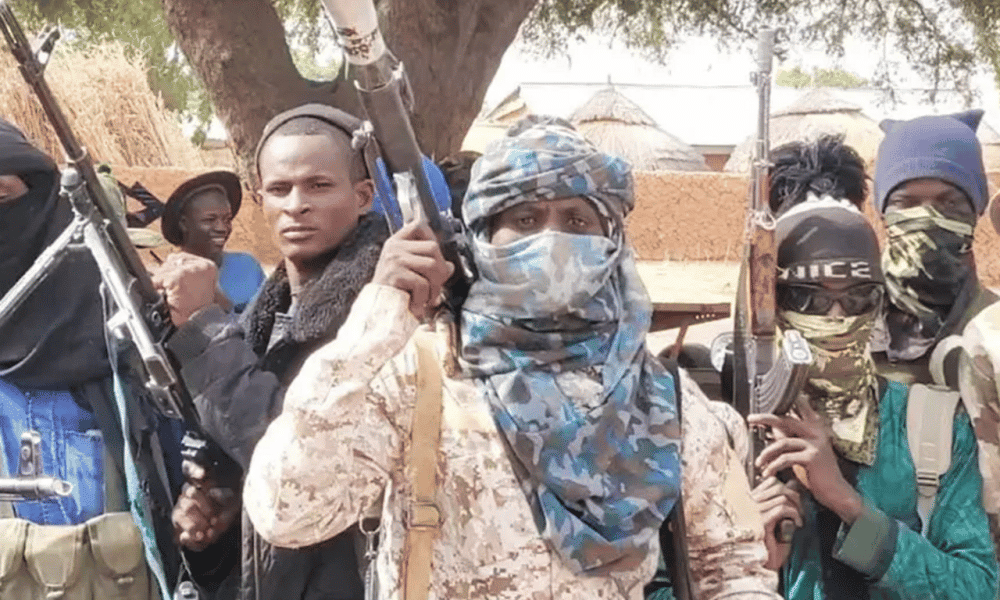A new terrorist group, Mahmuda, has escalated its attacks across Kwara and Niger States, raising alarm in several communities.
On Sunday night, suspected members of the group launched an assault on Ilesha Baruba and Kemaanji, Baruten, and Kaiama local government areas in Kwara State, leaving several dead and others wounded. The violence comes just days after more than 50 farmers were killed in similar attacks in Ukum and Logo local councils.
Reports suggest the assailants, dressed in military camouflage and riding motorcycles, stormed a market square at 9:30 p.m. and opened fire on residents before fleeing the scene. Among the casualties were four Fulani individuals, a vigilante, and a 19-year-old who was hit by a stray bullet. The attack is believed to be part of a series of reprisal attacks by the terrorists targeting local vigilantes.
According to Daily Trust, residents suspect that the motive behind the attacks is to displace local farmers and occupy their land. One local source described how the attackers fired at the Fulani individuals at close range, particularly targeting the vigilante who was armed with a dane gun. The violence also spread to Kaiama, where another vigilante was killed in a similar assault.
Terrorist Group Mahmuda’s Growing Influence
The Mahmuda group has been linked to an increasing number of violent incidents across the region, including kidnapping and killings in villages such as Kemaanji, Tenebo, Baabete, Nuku, and Nanu in Kaiama Local Government Area of Kwara State, as well as in parts of Yashikira District of Baruten Local Government Area. The group’s activities have extended into the Babana and Wawa districts of Borgu LGA in Niger State, prompting concerns over the spread of terrorism within these areas.
Despite previous claims from the federal government about successes in containing the violence, security experts believe the rise of Mahmuda suggests that more needs to be done to combat terrorism. Some experts have criticized the country’s intelligence system for failing to anticipate and prevent the emergence of such a group.
Governor AbdulRazaq Leads Delegation to Assess Situation
In response to the worsening situation, Kwara State Governor AbdulRahman AbdulRazaq led a high-level delegation that included military and intelligence chiefs to visit Kaiama and assess the security concerns. The delegation held a “strategic security interface” with the Emir of Kaiama, Alhaji Muazu Shehu Omar, and other key stakeholders. During the meeting, the governor confirmed that the recent attacks were a reprisal targeting vigilantes.
Governor AbdulRazaq assured the public that the state government is collaborating with the military and other relevant agencies to bring peace to the affected communities and dismantle the terrorist group. He expressed confidence that the ongoing efforts will lead to a resolution of the security challenges.
In the wake of the attacks, the Kwara State Police Command reassured residents that adequate security measures were in place to prevent further violence. Police spokesperson SP Adetoun Ejire-Adeyemi urged citizens to go about their lawful activities while remaining vigilant and cooperating with law enforcement. She warned that any individual or group attempting to destabilize the community would be dealt with decisively.
Fear and Tensions in Affected Communities
The Emir of Yashikira, Alhaji Umaru Seriki, expressed growing concern for the safety of his subjects, who are living in fear of the frequent attacks by the Mahmuda group. The violence is not confined to Kwara alone but has spilled over into neighboring Niger State, with incidents like the recent destruction of a security vehicle purchased by locals for vigilante operations.
Experts, including Abdullahi Garba, an intelligence and counter-terrorism specialist, have questioned the failure of Nigeria’s security agencies to anticipate the rise of the Mahmuda group. Garba pointed to the need for more proactive intelligence gathering, urging the Department of State Services (DSS), Defense Intelligence Agency (DIA), and National Intelligence Agency (NIA) to better address emerging threats.
Speaking to Daily Trust, Garba said, “I think the DSS, DIA, and NIA have questions to answer regarding how the new terror group penetrated the country. Why do we have intelligence agencies if we can’t determine this type of scenario in our country?” He emphasized that countering terrorism effectively requires intelligence agencies to be more proactive and thorough in their efforts.
Security Agencies’ Response
While the police spokesperson directed inquiries to the military, a source within the National Counter-Terrorism Centre (NCTC) confirmed that both the police and DSS are working around the clock to curb the activities of the Mahmuda group.
The source stated, “It is not an external threat; it is already an internal issue, and the police as the lead agency in maintaining internal security have taken over. The results will be obvious soon.”


